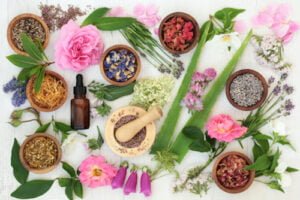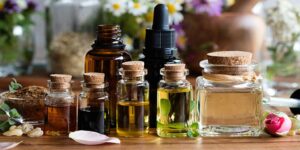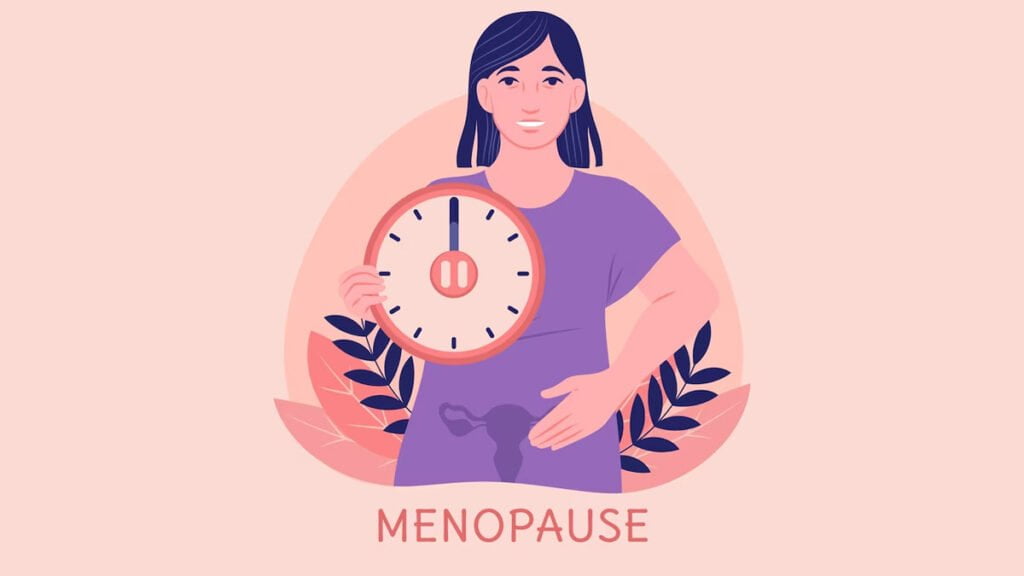Menopause is a natural and inevitable phase in a woman’s life, marking the end of her reproductive years. While this transition is a normal part of aging, the accompanying symptoms can be challenging. Many women seek alternatives to conventional treatments, turning to natural remedies that offer a holistic and gentle approach to managing menopause.
In this blog, we’ll explore various natural remedies, lifestyle changes, and practical tips to help women navigate this transformative journey with grace.
Contents
How To Treat Menopause?
While menopause itself doesn’t require treatment, many women experience symptoms that can be managed. Here are some general approaches to treating menopausal symptoms:
- Hormone Replacement Therapy (HRT): HRT involves taking estrogen and, sometimes, progesterone to replace the hormones that the ovaries no longer produce. This can effectively alleviate symptoms such as hot flashes and vaginal dryness. However, it’s essential to discuss the potential risks and benefits with a healthcare provider, as HRT may have side effects and associated health risks.
- Non-Hormonal Medications: Certain medications, such as selective serotonin reuptake inhibitors (SSRIs) and serotonin-norepinephrine reuptake inhibitors (SNRIs), may help manage symptoms like mood swings and hot flashes.
- Vaginal Estrogen: For women experiencing vaginal dryness and discomfort during intercourse, topical estrogen therapy in the form of creams, tablets, or rings may be prescribed.
- Lifestyle Modifications: Adopting a healthy lifestyle can help manage various menopausal symptoms. This includes regular exercise, a balanced diet, and adequate sleep. Avoiding triggers like caffeine, spicy foods, and alcohol can also help with symptoms like hot flashes.
Natural Remedies for Menopause
While some women may choose hormone replacement therapy (HRT) to manage symptoms, others may prefer natural remedies. It’s important to consult with a healthcare professional before trying any new treatments, even natural ones.
Here are some natural remedies that some women find helpful for managing menopausal symptoms:
Healthy Lifestyle Changes

Adopting a healthy lifestyle is essential for overall well-being and can significantly contribute to preventing chronic diseases, maintaining a healthy weight, and promoting mental and emotional health. Here are some key healthy lifestyle changes you can consider incorporating into your daily routine:
Balanced Diet:
- Eat a variety of fruits, vegetables, whole grains, lean proteins, and healthy fats.
- Limit processed foods, added sugars, and excessive salt intake.
- Stay hydrated by drinking an adequate amount of water throughout the day.
Regular Exercise:
- Aim for at least 150 minutes of moderate-intensity aerobic exercise or 75 minutes of vigorous-intensity exercise per week.
- Include strength training exercises at least two days a week.
- Find activities you enjoy to make exercise a sustainable part of your routine.
Adequate Sleep:
- Aim for 7-9 hours of quality sleep each night.
- Establish a consistent sleep schedule and create a relaxing bedtime routine.
Stress Management:
- Practice stress-reducing techniques such as meditation, deep breathing, yoga, or mindfulness.
- Identify and address sources of stress in your life.
Limit Alcohol and Avoid Tobacco:
- If you drink alcohol, do so in moderation (up to one drink per day for women and up to two drinks per day for men).
- Quit smoking and avoid exposure to secondhand smoke.
Regular Health Check-ups:
- Schedule regular check-ups with your healthcare provider for preventive care and early detection of potential health issues.
Maintain a Healthy Weight:
- Strive for a body mass index (BMI) within the healthy range.
- Focus on overall health rather than restrictive diets.
Herbal Remedies for Menopause

Always consult with a healthcare professional before incorporating herbal remedies into your routine, especially if you are taking medications or have underlying health conditions. Here are some herbal remedies that women have used to manage menopausal symptoms:
- Black Cohosh (Cimicifuga racemosa): Believed to have estrogen-like effects, black cohosh is often used to alleviate hot flashes, night sweats, and mood swings. Some studies suggest it may be helpful, but more research is needed.
- Red Clover (Trifolium pratense): Contains compounds known as isoflavones, which may have estrogen-like effects. Red clover is used to reduce hot flashes and improve bone density.
- Dong Quai (Angelica sinensis): Widely used in traditional Chinese medicine, dong quai is thought to balance hormonal levels and relieve symptoms such as hot flashes and mood swings.
- Ginseng (Panax ginseng): Some studies suggest that ginseng may help reduce the severity and frequency of hot flashes and improve overall well-being.
Dietary Supplements
Dietary supplements are products intended to supplement the diet and provide nutrients that may be missing or insufficient in one’s daily intake. While it’s generally best to obtain nutrients from a varied and balanced diet, some people may use supplements to address specific nutritional deficiencies or support overall health.
It’s important to note that not all individuals need supplements, and excessive intake of certain vitamins and minerals can have adverse effects. Here are some common dietary supplements and their potential benefits:
Multivitamins:
- Provide a combination of vitamins and minerals to support overall health.
- May be beneficial for individuals with nutrient deficiencies or specific dietary restrictions.
Vitamin D:
- Essential for bone health and immune function.
- Some people may need supplementation, especially those with limited sun exposure.
Calcium:
- Vital for bone health and muscle function.
- Often recommended for individuals with inadequate dietary calcium intake.
Omega-3 Fatty Acids:
- Found in fish oil supplements, omega-3s support heart health and may have anti-inflammatory effects.
- Recommended for individuals with low fish consumption.
Iron:
- Essential for the production of hemoglobin and prevention of iron-deficiency anemia.
- Often recommended for menstruating women or those with iron-deficiency
Mind-Body Techniques
Mind-body techniques involve practices that focus on the connection between the mind, body, and spirit to promote overall health and well-being. These approaches recognize the intricate relationship between mental, emotional, and physical aspects of health.
Incorporating mind-body techniques into your routine can help reduce stress, improve mood, and enhance overall quality of life. Here are several mind-body techniques that you may find beneficial:
Meditation:
- Involves focusing the mind on a particular object, thought, or activity to achieve a state of mental clarity, relaxation, and heightened awareness.
- Various forms of meditation include mindfulness meditation, transcendental meditation, and loving-kindness meditation.
Deep Breathing Exercises:
- Practices such as diaphragmatic breathing or abdominal breathing can help activate the body’s relaxation response, reducing stress and promoting a sense of calm.
Yoga:
- Combines physical postures, breath control, and meditation to enhance flexibility, strength, and mental focus.
- Different styles of yoga, such as Hatha, Vinyasa, and Kundalini, offer various approaches to mind-body integration.
Tai Chi:
- An ancient Chinese martial art that emphasizes slow, flowing movements, deep breathing, and mindfulness.
- Tai Chi is known for promoting balance, flexibility, and stress reduction.
Progressive Muscle Relaxation (PMR):
- Involves tensing and then gradually relaxing different muscle groups to release physical tension and induce a state of relaxation.
Guided Imagery:
- Involves using mental imagery to create a peaceful and calming mental environment.
- Visualization techniques can be guided by a script, a teacher, or recorded audio.
Essential Oils for Menopause Relief

Always consult with a healthcare professional before incorporating essential oils into your routine. Here are some essential oils that some women use for menopause relief:
Lavender (Lavandula angustifolia):
- Known for its calming and relaxing properties.
- May help alleviate stress and anxiety, and improve sleep quality.
Peppermint (Mentha × Piperita):
- Known for its cooling sensation.
- May be used to alleviate hot flashes when diluted and applied as a topical remedy.
Clary Sage (Salvia sclarea):
- Believed to have estrogen-like effects.
- Some women use clary sage to manage hot flashes and hormonal imbalances.
Geranium (Pelargonium graveolens):
- Known for its balancing properties.
- Some women find geranium oil helpful for mood swings and hormonal balance.
Chamomile (Matricaria chamomilla):
- Has calming and anti-inflammatory properties.
- May help with relaxation and sleep disturbances.
Ylang Ylang (Cananga odorata):
- Known for its calming and mood-enhancing effects.
- May be used to reduce stress and promote relaxation.
Frankincense (Boswellia Carterii):
- Has grounding and calming properties.
- Some women use frankincense for relaxation and emotional balance.
The Role of Phytoestrogens
Phytoestrogens are naturally occurring compounds found in certain plants that have a chemical structure similar to the hormone estrogen. They can mimic or modulate the effects of estrogen in the body, although their activity is generally much weaker than that of the body’s estrogen.
Phytoestrogens are classified into different groups, with the main types being isoflavones, lignans, and coumestans. Foods rich in phytoestrogens include soy products, flaxseeds, whole grains, legumes, and some fruits and vegetables.
The role of phytoestrogens has been a topic of interest, especially in the context of women’s health, as they have been suggested to have potential benefits during different life stages, including menopause.
Benefits of Natural Remedies for Menopause

Here are some potential benefits associated with natural remedies for menopause:
- Reduced Hot Flashes: Certain herbs like black cohosh and red clover are believed to have estrogen-like effects, which may help reduce the frequency and intensity of hot flashes.
- Improved Sleep Quality: Practices such as meditation, yoga, and relaxation techniques can contribute to better sleep by reducing stress and promoting relaxation.
- Mood Stabilization: Herbal remedies like St. John’s Wort and lifestyle changes such as regular exercise and a healthy diet may contribute to improved mood and emotional well-being.
- Bone Health Support: Some natural remedies, including calcium and vitamin D supplements, may contribute to maintaining bone density and reducing the risk of osteoporosis.
- Hormonal Balance: Certain herbs, such as dong quai and black cohosh, are believed to help balance hormonal levels during menopause, potentially alleviating associated symptoms.
Conclusion
Navigating menopause can be a challenging yet empowering journey. By embracing natural remedies, women can find relief from symptoms while prioritizing their overall well-being. From herbal supplements to lifestyle adjustments, the array of options allows for a personalized and holistic approach to this transformative phase.
If you are facing menopause related issues, menopause treatment at HerMantra can help. Book your free trial online menopause treatment session now.


